5 types of pools to inspire your next staycation
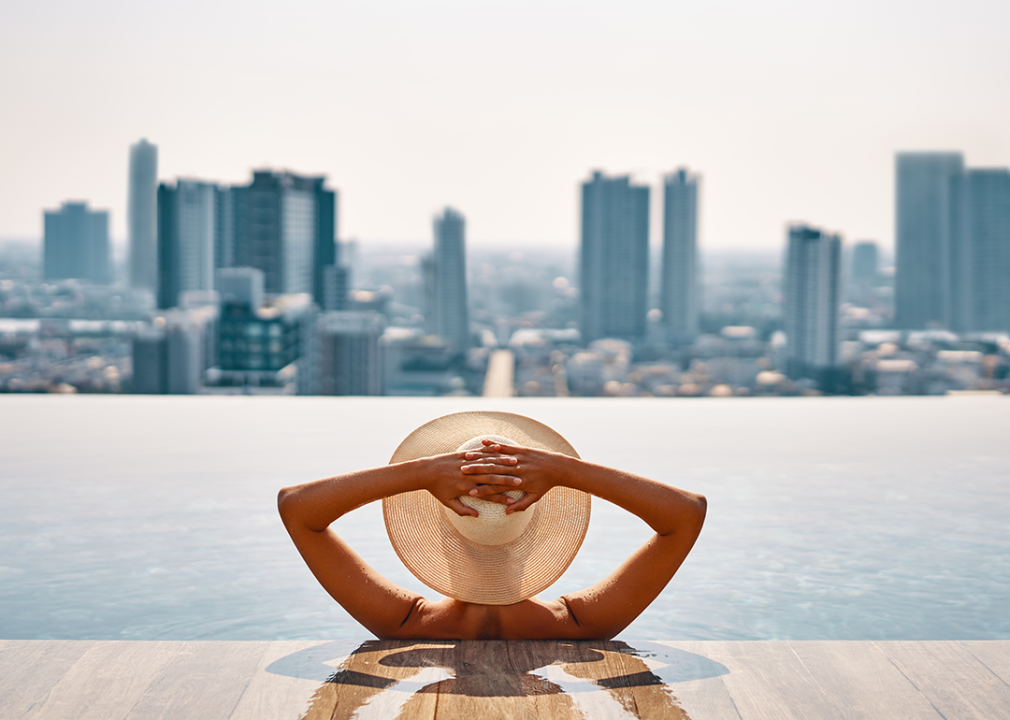
Viktor Gladkov // Shutterstock
5 types of pools to inspire your next staycation
Woman wearing hat in urban infinity pool, looking out toward city buildings.
Staring at the sky as you float. The sounds of the world’s kinetic energy subdued. When submerged beneath the water’s glassy surface, the thump of your heartbeat transforms into your own private soundtrack.
Lou Stoppard, curator, broadcaster, and author of the photo book, “Pools: Lounging, Diving, Floating, Dreaming: Picturing Life at the Swimming Pool” encapsulates the experience in an interview with British clothing brand Orlebar Brown: “My favourite pool memories are more about a feeling than a specific place or pool. It’s that feeling you get when you are underwater, swimming, and all worries dissipate. It’s a wonderful, liberating, meditative feeling. Of course, sometimes I swim to socialise, but mostly I swim to be truly alone.”
Swimming can feel transformative—and studies prove it is. Swimming in pools is a more accessible activity for many as it is easier on the joints for older people or those dealing with injuries.
Images of pools have become chiseled into the cultural consciousness, too: the cover of Nirvana’s “Nevermind” album, with a baby floating toward a dollar bill; the kaleidoscopic images of synchronized swimmers in a circle, kicking in unison, in Busby Berkeley’s golden oldie movies; the lifeguard scene in “The Sandlot,” to name a few.
But the earliest known “pools,” or human-made public baths, go back to 2500 BCE in the Indus Valley. Anthropologists say “The Great Bath” was likely used as a temple. Modern-day pools often represent time with family and friends, offer health and wellness, and can help you tap into the world of luxury.
Today, you can rent a private pool in your neighborhood through an app, search for the nearest public one online, or get a full-on luxury treatment by venturing further. Giggster searched industry publications and media articles to find some of the best pool experiences that might just encourage you to dive into some R&R.
![]()
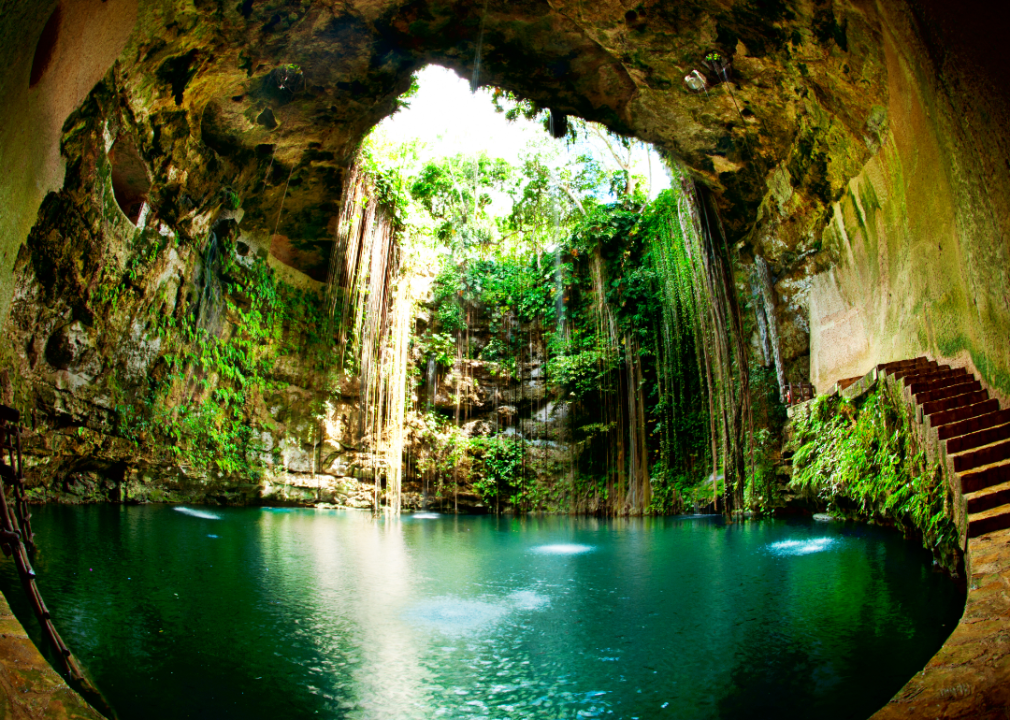
Canva
Cave pools (aka cenotes)
The view from inside a cenote in Chichen Itza Mexico.
Cave pools offer a way to stay cool while feeling a sense of seclusion. They’re modeled from naturally occurring “cenotes,” which dot the landscape in Cancun, Tulum, Playa del Carmen, and Yucatán in Mexico. Cavernous cenotes are usually composed of rainwater and filtered by the earth above. In them, you might float below stalactites or even spy bats grasping onto the limestone.
Artificial cave pools can include a “grotto” feature, which may consist of a waterfall that overlays a small cave, emulating the real-deal underground swimming sites. In 1973, Playboy’s publisher and editor Hugh Hefner financed a large, cave-like grotto and swimming pool that would become the backdrop for risqué photo shoots and launched the lagoon-style pool into 1970s culture.
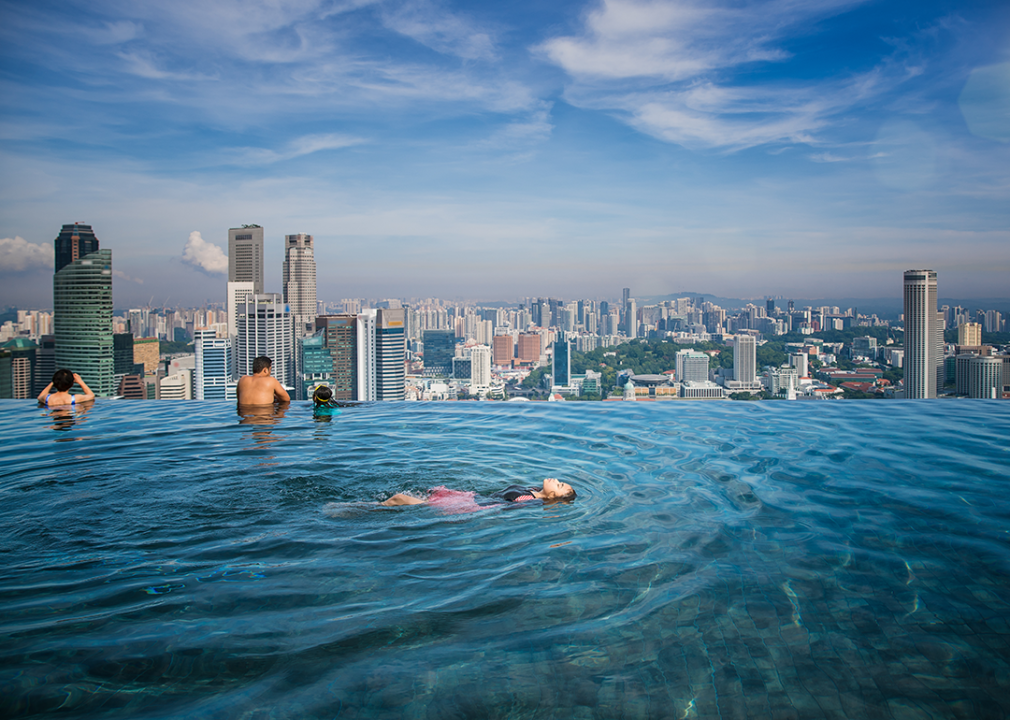
anek.soowannaphoom // Shutterstock
Infinity pool
People swimming in Singapore rooftop infinity pool, looking out toward the city.
That seemingly endless horizon line of water you see could be a mirage—or if you’re on Instagram, it’s probably an infinity pool. Known for a pool edge that looks like it vanishes into the landscape, infinity pools spool over a wall that usually overlooks cityscapes and are a calling card for luxury hotels, resorts, and some estates.
In the 1950s, architect John Lautner, an apprentice to Frank Lloyd Wright, designed the first infinity pool in Los Angeles. Decades later, the pool is still iconic.
If you really want to live on the edge, The Joule hotel’s infinity pool in Dallas, Texas, juts out 8 feet beyond the edge of the 10th floor, with a Plexiglass front wall. In Ubud, Bali, travelers can have a similar swim, with a pool over a jungle at the Hanging Gardens Luxury Hotel and Spa.
However, the Marina Bay Sands Hotel in Singapore is the world’s most famous infinity pool, sitting upon a cantilevered platform on top of the 57-story resort, curving around one side of the SkyPark. A visitor told The Outline that other visitors were “shameless” about getting the perfect photo, perhaps to justify the $450-a-night experience.
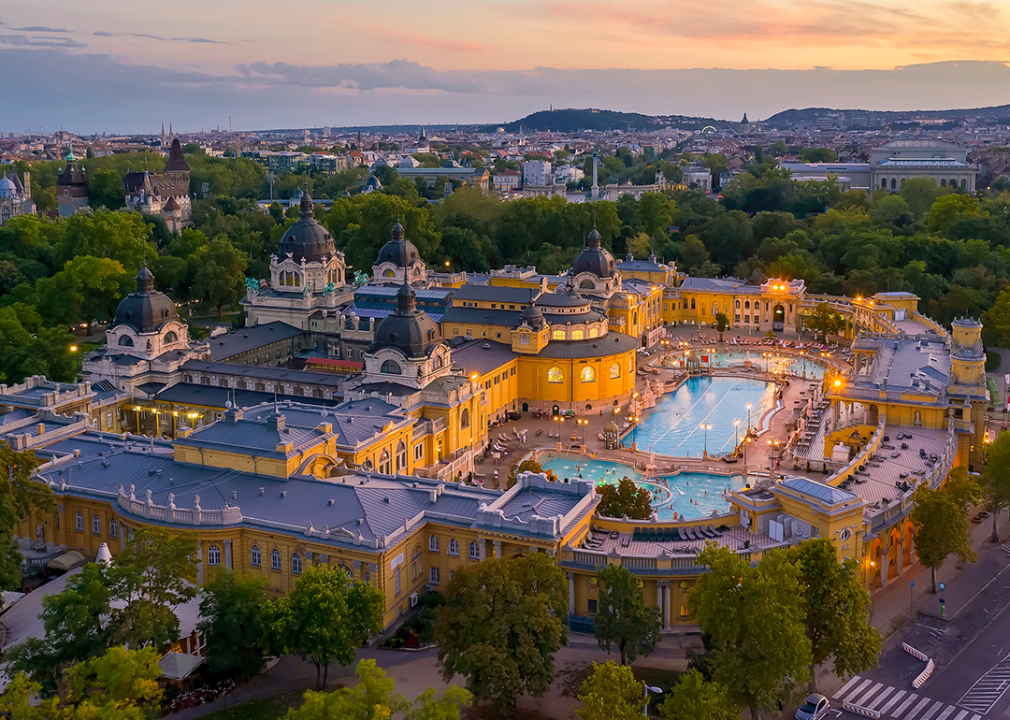
Kurka Geza Corey // Shutterstock
Communal bathhouses
Aerial view of thermal bath in Budapest at sunset.
Call it what you will: banya, onsen, sauna, hammam, mikveh, jjimjilbang, gymnasium, spa—around the world, most cultures have a form of bathhouse.
Communal bathhouses have been an important part of religion, wellness, and culture for centuries, but it took longer to pick up in popularity in the U.S., only gaining speed in the Gilded Age. In 1891, the People’s Baths helped cater to the 97% of tenement dwellers without access to bathtubs or water to bathe in. Initially, it was a strictly cleansing experience, but eventually, bathers learned to pay off attendants to lengthen their stay and allow for socializing.
Bathhouses now equate to a luxurious act of self-care and can be pricey, but they are found in many American cities and are in demand following the isolation of the pandemic.
If you want to venture out further for the experience, consider adding Budapest, aka the “City of Spas,” to your bucket list. If a good photo is paramount, head to the thermal Gellért Baths designed in the Art Nouveau style. Closer to home, Colorado’s Springs Resort & Spa overlooks the San Juan River, with water for its 23 soaking tubs coming from the world’s deepest geothermal hot springs at around 1,002 feet.
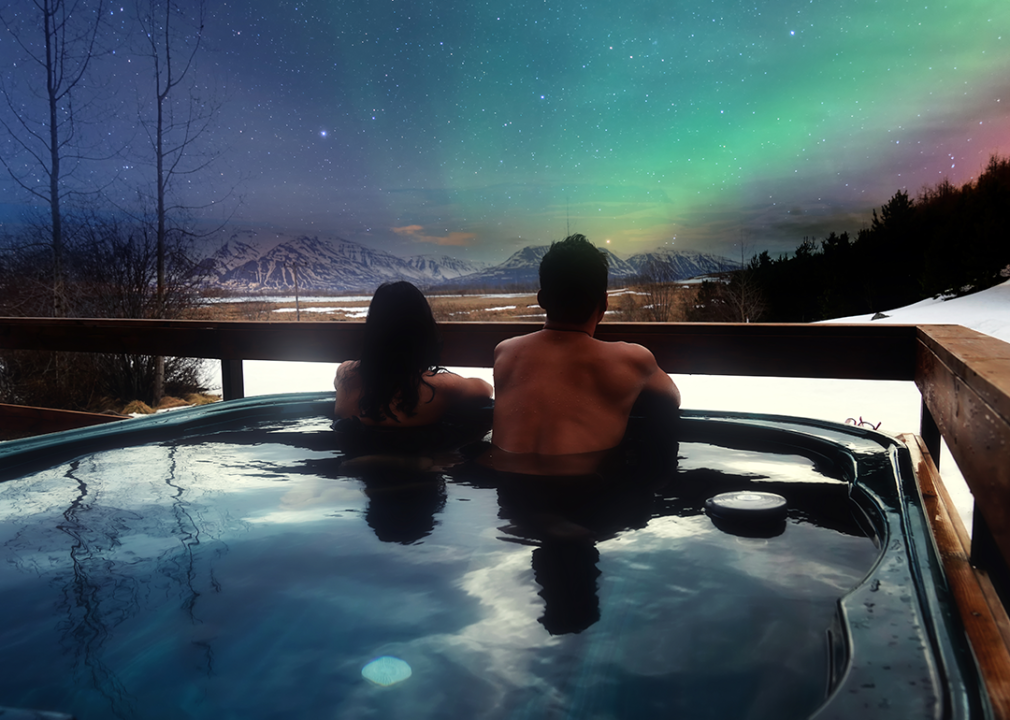
Phonix_a Pk.sarote // Shutterstock
Hot tubs
A couple in hot tub at night in Iceland looking at the northern lights.
While bathhouses serve communities en masse, the first bath that integrated jet whirlpools with equal amounts of water and air entered the market in 1956 with the Roman by the company Jacuzzi. The design was amended from an earlier version that used their patented hydrotherapy pump to reduce rheumatoid arthritis. Jacuzzis soon became a household name, with Elvis and Marilyn Monroe both owning one. By 1970, the size of the units expanded to become self-contained family-sized spas that we still use today.
Installing a hot tub is cheaper than an average pool, doesn’t involve permits, and can be used year-round, so it’s no wonder the hot tub and spa industry is still growing.
Tourists looking for private hot tub experiences that overlook waterscapes can take their pick: soak in a private jacuzzi at Katikies Mykonos in Greece with a view of the Aegean Sea, relax at Fiji’s Namale resort for adults only in a heart-shaped hot tub sitting at the mouth of the ocean, or gaze at the mountains and water from a private hot tub at Faro di Brucoli, across the Gulf of Catania in Sicily, Italy.
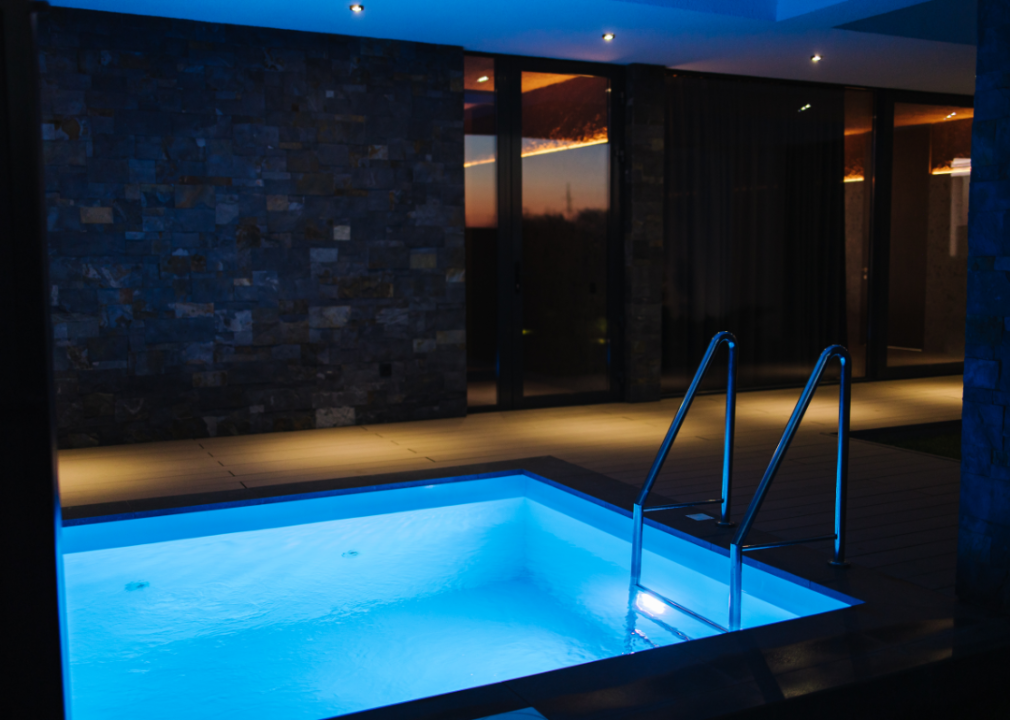
Canva
Plunge pools
A plunge pool filled with cold water is illuminated at night.
Those who know and love Wim Hof, the Netherlander “Ice Man” who touts the mental and psychological benefits of cold plunges, may already be sold on the freezing-cold plunge pools that test endurance and force mindful breathing and meditation to withstand the experience.
For the extreme-temperature adverse, plunge pools can be any temperature. Some models even double as hot tubs. The pools are defined by their small sizes of varying depths between 3 and 7 feet, mimicking the deep basin swimming holes in nature at the bottom of waterfalls. Some Americans even call them “cocktail pools”—designed for just a dip. They’re cheaper to buy and maintain, and their smaller footprint acts as an add-on to a backyard rather than taking it over as standard pools do.
In the world of water recreation, one might say plunge pools defined 2023. Better Homes & Gardens reported one design firm, Yardzen, saw a 15% increase in requests year-on-year.
If you’d prefer to test drive the plunge pool experience while on vacation, St Lucia’s Ladera Resort, located in the Caribbean, offers adults-only luxury with private plunge pools sitting in a valley of the Piton Mountains, amid the rainforest and the sea. Another option, the Aqua Wellness Resort Tree House suites and villas in Nicaragua’s Redonda Bay off the Pacific Ocean, boasts private plunge pools with views of the bay.
Story editing by Carren Jao. Copy editing by Kristen Wegrzyn.
This story originally appeared on Giggster and was produced and
distributed in partnership with Stacker Studio.
